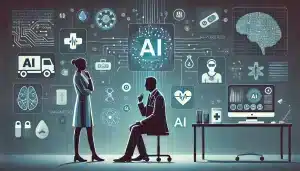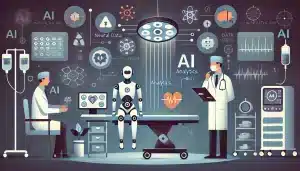The integration of artificial intelligence in healthcare has rapidly transformed how medical diagnosis and treatment are approached. AI technologies are increasingly being applied in various aspects of healthcare to enhance accuracy, efficiency, and patient outcomes. From disease diagnosis to personalized treatment plans, AI is redefining the roles of healthcare providers and improving the quality of care. This article delves into the applications, benefits, and future potential of AI in the healthcare industry, while also addressing important ethical considerations and the necessary training for healthcare professionals.
How is AI in Healthcare Transforming Diagnosis and Treatment?
What are the Most Common Applications of AI in Diagnosis?
AI in healthcare has significantly improved the accuracy and speed of medical diagnosis. The use of AI algorithms in analyzing medical images, such as X-rays, CT scans, and MRIs, allows for precise detection of anomalies that might be missed by human eyes. For example, AI is commonly used in detecting early signs of diseases like cancer by examining patterns in vast datasets of medical images. Furthermore, machine learning models are trained to recognize symptoms and suggest potential diagnoses based on patients’ medical histories and health data, leading to more confident and timely medical diagnoses.
How Does AI Assist in Treatment Plans?
The ability of AI to process and analyze large amounts of medical data is invaluable in formulating personalized treatment plans. AI can evaluate a patient’s health records, including previous diagnoses, treatments, and outcomes, to recommend the most effective treatment options. AI also assesses the potential side effects and success rates of various treatments, helping healthcare professionals to devise tailored plans that enhance patient care. The use of AI in treatment planning fosters a more holistic approach to patient care, ensuring that individualized needs and circumstances are meticulously considered.
What Types of AI Are Used in Healthcare Diagnoses?
Several types of AI are used in healthcare diagnoses, each tailored to specific applications. Machine learning algorithms, including supervised and unsupervised learning, are commonly employed to interpret complex medical data and detect patterns indicative of disease. Deep learning models, particularly convolutional neural networks (CNNs), excel in image recognition tasks and are frequently used for analyzing medical images. Natural language processing (NLP) techniques facilitate the analysis of textual medical records, enhancing the ability of AI to extract meaningful insights from unstructured data. These AI techniques collectively contribute to accurate and efficient disease diagnosis.
What are the Examples of AI in Healthcare?
Which Artificial Intelligence Technologies Are Prominent in Medical Imaging?
In the realm of medical imaging, AI technologies have revolutionized the way radiologists operate. Convolutional neural networks (CNNs) and other deep learning architectures are prominently used to interpret medical images with high accuracy. These AI systems can detect and classify abnormalities in radiological images, such as tumors or fractures, often with greater precision than traditional methods. Furthermore, AI-powered imaging tools assist in tracking disease progression and evaluating the effectiveness of treatments, providing healthcare professionals with invaluable insights for patient management.
How is AI Being Used in Electronic Health Records?
Electronic health records (EHRs) have been significantly enhanced through the use of AI. By applying AI algorithms to EHR data, healthcare providers can identify patterns and trends that may not be immediately obvious. AI-driven tools aid in predicting patient outcomes, flagging potential health risks, and automating administrative tasks to reduce the burden on healthcare workers. Additionally, AI use in EHRs helps in personalizing patient care by analyzing comprehensive health records, enabling more informed and timely medical decisions.
What Are Some Success Stories of AI in Cancer Diagnosis?
AI technologies have shown great promise in the early detection and accurate diagnosis of cancer. One notable success story is the application of AI in screening mammograms for breast cancer. AI systems have demonstrated the ability to identify malignancies at earlier stages than traditional methods, which can significantly improve survival rates. Another success story involves the use of AI in analyzing pathology slides for colorectal cancer, enhancing diagnostic precision. These advancements underscore the transformative potential of AI in improving cancer diagnosis and treatment outcomes.
How Can Healthcare Professionals Effectively Use AI?
What Training is Required for Healthcare Professionals to Use AI?
To effectively use AI in healthcare, medical professionals need comprehensive training that encompasses both technical and clinical aspects. Training programs should cover the fundamentals of AI technologies, including machine learning and deep learning algorithms, and their specific applications in healthcare. Additionally, healthcare workers must understand how to interpret AI-generated insights and integrate them into clinical practice. Collaboration between AI experts and healthcare professionals is crucial to ensuring that training is practical and aligned with clinical needs.
How Can Medical Professionals Integrate AI into Their Practice?
Integration of AI into medical practice requires a strategic approach that involves both technological and organizational adjustments. Healthcare organizations should invest in robust AI infrastructures, including the necessary hardware, software, and data management systems. Medical professionals must adopt a collaborative mindset, working closely with data scientists and AI specialists to tailor AI tools to clinical workflows. Moreover, continuous education and training programs are essential to keep healthcare providers updated on the latest AI advancements and their applications. Effective integration also entails establishing protocols for the ethical use of AI and promoting a patient-centric approach.
What Role Does AI Play in Enhancing Patient Care?
The role of AI in enhancing patient care is multifaceted. AI technologies facilitate more accurate and timely diagnoses, enabling early intervention and effective treatment plans. By personalizing care based on individual health data, AI ensures that treatments are tailored to each patient’s unique needs, improving health outcomes. Additionally, AI applications can streamline administrative processes, allowing healthcare providers to focus more on direct patient care. AI systems also empower patients by providing them with actionable health information and predictive insights, fostering proactive health management and better overall well-being.
What are the Ethical Considerations of Using AI in Healthcare?
What Are the Patient Data Privacy Concerns?
The use of AI in healthcare raises significant concerns regarding patient data privacy. AI systems often require access to sensitive medical information, which must be safeguarded against breaches and unauthorized access. Ensuring data privacy involves implementing robust security measures, such as encryption and secure data storage, as well as adopting stringent data governance policies. Healthcare organizations must also obtain informed consent from patients for the use of their health data in AI applications. Transparent communication about data usage and privacy measures is essential to maintaining patient trust.
How Can Biased Machine Learning Algorithms Affect Medical Decisions?
Biased machine learning algorithms can result in unfair and inaccurate medical decisions. Bias in AI can arise from various sources, including unrepresentative training data and flawed algorithm design. If not addressed, these biases can exacerbate health disparities and lead to suboptimal care for certain patient groups. To mitigate bias, healthcare professionals and AI developers must collaborate to ensure diverse and representative datasets, regularly audit AI systems for fairness, and implement corrective measures as needed. Ethical AI use mandates ongoing efforts to eliminate bias and promote equitable healthcare.
What Measures Ensure Transparency and Accountability in AI Applications?
Transparency and accountability are critical for the trustworthy use of AI in healthcare. Healthcare organizations must ensure that AI systems’ decision-making processes are explainable and understandable to both medical professionals and patients. Implementing transparency involves documenting how AI algorithms work, the data they use, and the criteria for their outputs. Accountability measures include rigorous validation and testing of AI tools, as well as establishing protocols for their oversight and monitoring. Compliance with regulatory standards and ethical guidelines further reinforces the responsible use of AI in healthcare.
What is the Future of Artificial Intelligence in Healthcare?
How Will AI Revolutionize New Drug Development?
AI is poised to revolutionize new drug development by significantly accelerating the discovery and testing processes. AI techniques, such as machine learning and deep learning, can analyze vast datasets of molecular compounds to identify potential drug candidates with high precision. AI can also predict how new drugs will interact with biological systems, reducing the time and cost associated with traditional laboratory testing. Additionally, AI-driven simulations and models enable researchers to explore novel therapeutic pathways, fostering innovation in drug development and bringing effective treatments to market faster.
What Future Trends Can We Expect in Medical Research?
The future of medical research will be heavily influenced by the integration of AI, leading to transformative advancements. We can expect AI to play a crucial role in genomics and personalized medicine, where it can analyze genetic data to identify disease predispositions and tailor treatments accordingly. AI will also enhance clinical trials by optimizing patient recruitment and monitoring trial outcomes in real time. Furthermore, the combination of AI and robotics may lead to breakthroughs in surgical procedures and rehabilitation therapies. These trends highlight the potential of AI to drive innovation and improve health outcomes in medical research.
How Will the Use of AI Evolve in Healthcare Systems Globally?
The global healthcare systems are increasingly embracing AI to address diverse medical challenges and improve care delivery. In the coming years, the use of AI is expected to become more widespread, with developing and developed countries alike leveraging its capabilities. AI’s role will expand beyond diagnostic and treatment support to include predictive analytics, preventive health measures, and enhanced patient engagement. As AI technologies continue to evolve, international cooperation and knowledge sharing will be crucial in addressing common healthcare issues and ensuring equitable access to AI-driven advancements globally.





